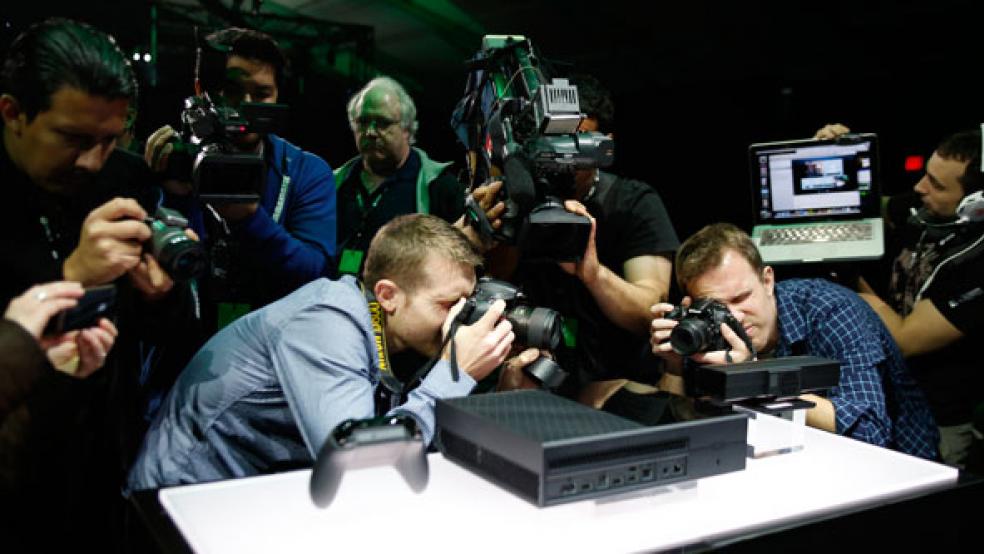Microsoft spent over an hour and a half showcasing the Xbox One and the many games that will launch with the new console—but only one moment made the entire crowd gasp.
Phil Spencer, general manager of Microsoft Game Studios, announced Monday that Microsoft's next generation console would be available in November—at a price of $499. And almost immediately, the air went out of the room.
Analysts and gamers has expected Microsoft to price the Xbox One at least $100 lower—and they were quick to voice their disappointment.
"The launch price is above our expectations, and potentially pushing the envelope as Microsoft looks to expand the console beyond the core gaming demographic and to a broader consumer audience," said Edward Williams of BMO Capital Markets.
The Xbox One has already been a source of controversy since its debut, as confusion about the system's policies regarding used games, game sharing and the need for an always-on Internet connection persisted.
After issuing conflicting statements, Microsoft finally offered its official policies on each late last week. While the gaming world was happy to get clarity, not everyone was happy with the answers.
Now they're upset once again with the system's price, raising the question: Will this continuing series of controversies hurt Microsoft's chances in the next generation of game systems?
Long term, that remains to be seen, but short term, it might. The question is how much?
Like the PlayStation 4, the Xbox One will be supply constrained this holiday season. That's by design, of course. There's no better way to position your product as being a must-have than by ensuring there's not quite enough at retail.
And while people might be grumbling now, there's a contingent of core gamers who are early adaptors—and will be willing to buy new consoles regardless of price when they first come out, giving them bragging rights among their friends.
Sony, however, seized the opportunity to win over consumers—announcing Monday night that the PS4 would cost $399—$100 less than the Xbox One. And undercutting the Xbox One's price was just one of the many shots Sony took at Microsoft at its annual E3 press conference.
To raucous applause, Sony's Jack Tretton also announced that the PS4 would put no restrictions on used games, letting players play used games and lend titles to friends. Additionally, he said, the system will not require any form of Internet connectivity, a direct hit at Xbox One's convoluted online connection requirements.
"If you enjoy playing single player games offline, the PlayStation 4 won't require you to check in online—and it won't stop working if you haven't authenticated within 24 hours," said Tretton, president of Sony Computer Entertainment of America.
On a larger scale, it will be interesting to see what happens in late 2014 and early 2015.
Microsoft has offered subsidized versions of the Xbox 360 for the past year, charging just $99 for the system if buyers agree to subscribe to Xbox Live for two years. Many analysts had expected the company to offer something similar with the Xbox One, but it's possible Microsoft felt there wasn't a need to do so this early in the system's life.
Of course, that's not a strategy that worked well for Sony this generation. The PlayStation 3 was originally priced at $599— $100 higher than Xbox 360—and quickly lost ground to the competition.
And for the Xbox One, the competition may not be limited to just Sony and Microsoft.
"When you're on the cusp of facing massive competition in the living room from Apple and Google, what's in Microsoft's best interest is to drive as large of an install base as quickly as possible," says Colin Sebastian of R.W. Baird.
Of course, it's also entirely possible that $499 isn't the only price the Xbox One will sell at. Microsoft is said to be still in negotiations with Comcast and other companies about supplementing the cost. Should those come to fruition before launch, it could offer an alternative to consumers.
Microsoft has had the industry's best-selling console for 28 months—and the Xbox 360 will likely maintain that lead for some time, even with the introduction of next generation systems. But if it wants to continue to lead the field, it has to hope the games and business deals it has signed with publishing partners will be sufficiently strong to make players get over any bad will the price and its other policies might have created. In the end, content is king.
"The risk you face with pricing the hardware too high is it limits the number of games people can buy," said Sebastian.
There's also, to some degree, the Internet echo chamber at work here. Gamers love to complain, but if the games are good enough, they'll usually buy them. And at this point, there's no better thing to complain about than the price of a console.
"People would have complained if it was $399," said P.J. McNealy of Digital World Research. "People would have complained if it was $299. And if it was free, it wouldn't have been free enough."
Disclosure: Comcast is the owner of NBCUniversal, the parent company of CNBC and CNBC.com.
This article originally appeared at CNBC.com. Read more From CNBC.com:
At E3 Trade Show, Hoping for a Video Game Rebound
EA Launches 11 New Games at E3 — but None for Nintendo
Hot Video Games, Bucking the Down Trend

